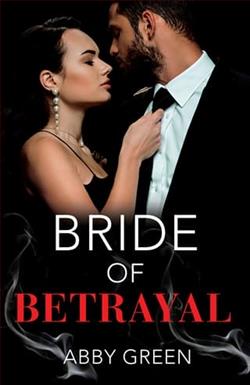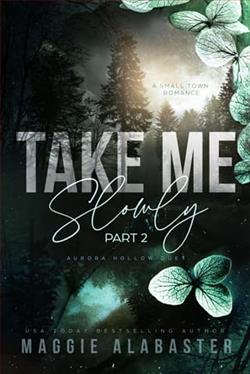Page 81 of Married to the Earl
A light was shining in from the doorway. Conor blinked and tried to focus his eyes around it, to see who was there. After a moment, the visual became clear—it was the constable, holding a lantern and beckoning him forward.
Conor, much to his own consternation, was afraid to get up and move. “What’s going on?” he asked.
“You’re being released,” the constable said.
“Released?” Conor couldn’t suppress the surge of vindication that rose up in him. “Did you catch the real killer, then?”
“Temporarilyreleased,” the constable said. “You’ll still have to stand trial. Butsomeonethinks it’s appropriate to allow you to await trial at home in your manor.” His tone made it abundantly clear that he was not that someone.
Conor got to his feet and came to the door. The constable stood back to let him pass, his face twisted with dislike.
“You still think I’m guilty?” Conor asked.
“Whether you’re guilty or not, there’s a right way and a wrong way to do things,” the constable said. “Prisoners stay here until they go to trial. That’s the way it’s done. To bend the rules for you, just because of who you are…”
“It wasn’t my decision,” Conor reminded him.
“But you’ve got no problem taking advantage of it.”
“I have a wife at home,” Conor said. “I have responsibilities. I can’t choose to stay in jail and leave her on her own if I have the option to go home to her. I don’t think you’d choose any differently, either, if you were in my shoes.”
The constable said nothing, merely led Conor to the front desk. He disappeared into an adjoining room for a few minutes and returned with a small box. “Your effects.”
Conor pocketed the money he’d had on his person when he’d been brought in. It already felt like a lifetime ago. “Thank you,” he said.
“We can summon a carriage to take you home,” the constable offered.
“I’d be much obliged.” In truth, Conor didn’t want to accept anything from the police after the way he had been treated. But a carriage would get him home much more quickly than walking would, and he yearned to see Astrid.
She had been so frightened when he’d been taken. What must she be thinking now? She had been on her own for days.
He had always admired her strength, her ability to stand up for herself, and he thought she was probably better equipped to deal with a crisis like this than other men’s wives might have been. But still, it couldn’t have been easy for her.
She’s still so new to this world, he thought.She entered into a marriage specifically to avoid losing her father to arrest, and just a few weeks later, her husband is arrested. She must be in pieces.
He had to get to her as soon as possible. He wanted nothing more than to put his arms around her and reassure her that everything would be all right, that he was home now and that he would make sure a defense of his case was put together.
I can afford to hire the best lawyers. I’ll get through this. It’s going to be all right.
The carriage arrived. Conor bid a strained farewell to the constable. The man had only been doing his job, Conor knew, but it was still a hard thing to forgive. He would never forget the shame and pain of being dragged out of his home and away from his wife.
Still, as the carriage pulled away and the barren land around the jail gave way to the lush greenery of the countryside, Conor began to feel better.I’m on my way to Astrid, he thought, feeling happy and hopeful.I’m going to see her soon.
Please just don’t let her be too heartbroken over all of this.
The two of them had only just begun to really trust each other. Conor had no experience in the matter, but he imagined that something like this had the potential to either bring a couple closer together or push them apart. He hoped desperately for the former.
There was another matter plaguing Conor, as well. Why had he suddenly been released from his cell? What had changed that had led to the constable opening that door and letting him go free?
Someone thinks it’s appropriate to allow you to await trial at home. That was what he had said. But who wassomeone? Who had the power to sway legal decisions, to sway the constable when it came to who was locked up in his jail?
It was a power Conor thought he himself might have had, under different circumstances.I probably could have persuaded him to let somebody go home until their trial,he thought.I am the Earl of Middleborough, after all. It’s my taxes that pay for most of what the police force needs.
And hadn’t he had the power to absolve Tobias Dawson of his crime? He had gotten Astrid’s father off the hook without so much as blinking. The police had never been involved in that case, of course, but Conor didn’t delude himself that it mattered. If they had known about Tobias Dawson’s crime and Conor had told them to drop it, they would have.
But that’s different. Theft is a completely different thing from murder. If they truly believe I’m responsible for Lord Hayward’s death, what could possibly persuade them to let me go?
He didn’t know. And the not knowing spooked him. It felt as though he’d agreed to a bargain without knowing the terms. What had he given up in payment for this unexpected freedom? What was the catch?















